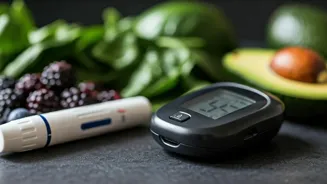Focus on Diet
Making dietary modifications is crucial for managing pre-diabetes. A balanced diet emphasizing whole foods is a primary step. The emphasis should be on consuming
foods with a low glycemic index (GI) to minimize rapid blood sugar spikes. This includes non-starchy vegetables, lean proteins, and whole grains. It is beneficial to limit the intake of processed foods, sugary drinks, and refined carbohydrates. Portion control is also important to effectively manage blood sugar levels. Try incorporating foods such as leafy greens, berries, and lean meats into your diet. Moreover, drinking sufficient water will also aid in regulating your blood sugar levels. Consult with a nutritionist or healthcare professional for personalized dietary guidance tailored to your specific needs.
Regular Physical Activity
Regular exercise is an effective way to increase insulin sensitivity and help your body use glucose more efficiently. Engage in at least 150 minutes of moderate-intensity exercise or 75 minutes of vigorous-intensity exercise per week. Activities like brisk walking, cycling, swimming, or dancing can be beneficial. Exercise helps improve glucose uptake by muscles and increases overall metabolic health. Even short bursts of physical activity throughout the day, like taking the stairs instead of the elevator or going for a walk during your lunch break, can have a positive impact. Consistency is vital; try to incorporate exercise into your daily routine for the best results. As you become more comfortable, gradually increase the intensity and duration of your workouts.
Monitor Blood Sugar
Regularly monitoring blood sugar levels is essential for managing pre-diabetes. By checking blood glucose regularly, you gain insight into how food, exercise, and other lifestyle factors affect your blood sugar. This information allows you to adjust your habits and identify patterns that can guide you in managing your condition effectively. Use a blood glucose meter at home to test your levels. A good starting point would be to check your blood sugar before and after meals, and at bedtime, as recommended by your healthcare provider. Keep a detailed record of your readings and any changes you make to your diet or exercise routine. This log will assist your doctor in assessing your progress and adjusting your treatment plan if necessary.
Prioritize Weight Management
Weight loss is often a key factor in reversing pre-diabetes, especially for individuals who are overweight or obese. Losing even a small percentage of your body weight can significantly improve insulin sensitivity and reduce the risk of progressing to type 2 diabetes. Focus on sustainable lifestyle changes rather than quick fixes. Aim for a gradual weight loss of one to two pounds per week through a combination of diet and exercise. Consult with your healthcare provider or a registered dietitian to develop a personalized weight management plan. They can provide guidance on healthy eating habits and appropriate exercise routines. Remember that consistency and patience are key; small, steady steps can lead to significant long-term results.
Manage Stress Levels
Chronic stress can contribute to elevated blood sugar levels, making pre-diabetes management more challenging. Practice stress-reducing techniques regularly to help control your blood sugar. Try incorporating mindfulness, meditation, yoga, or deep breathing exercises into your daily routine. These practices can lower cortisol levels, which can impact your blood glucose. Regular physical activity, such as walking or jogging, is also a great way to manage stress. Make sure you have healthy sleep habits, as sleep deprivation can increase stress and negatively affect blood sugar. Prioritizing self-care and relaxation is vital for your overall health and for successful pre-diabetes management. Consider activities that bring you joy and relaxation to help alleviate stress.




















